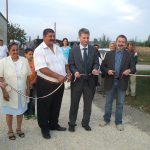
Győrsági útátadás
2009.10.08.Development and networking of Roma organizations in the sub-regions of Transdanubia (Dunántúl)
2010.09.01.TITLE:
Road transfer, Győrság
DATE:
2009.10.08.
There are not many slum areas in the county, but one of them is Puszta Street in Győrság and its surroundings.
The Association was visited by the then president of the Roma minority self-government to ask for help, because the students attending school and the working adults cannot get to their destination properly. The cause of this was the dirt road connecting the „Roma settlement” and the village, which became so muddy during the rain, that the students and the workers arrived to their school and workplace dirty. This led to problems, as a gypsy worker was not allowed to take the bus and children were made fun of at school, because of their appearance. The Association has therefore applied to the County Regional Development Fund to turn it into a gravel road. The application was a success and the Association received 400.000.- HUF. The management visited the mayor Zsolt Ferenczi to help, because the four hundred thousand forints alone were not enough for the dirt road. The Mayor was very surprised that the Roma were such initiators and that they had even made money to realize their idea, so he offered to give double of the money from the municipal budget. Thus, from 1.200.000.- forints, and from the voluntary work of the locals, a new, now gravel road has been introduced, leading from the Gypsy settlement to the village. At the time of the road transfer, the problem arose that public lighting is not properly built on one of the houses. The mayor offered that if the Gypsy minority self-government and the Czinka Panna Roma Cultural Association raise 1-1 lamp post, then he would also add one, so the public lighting could be built. The Association and Gypsy minority self-government accepted this and as a continuation of the road development, the construction of public lighting was also realized. Then the Roma began to keep the area in front of the houses in order, and there was a family who made a small porch so they could sit in front of the house in the evenings.
